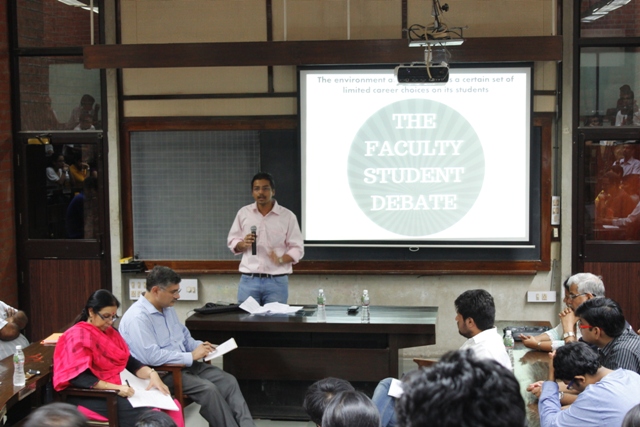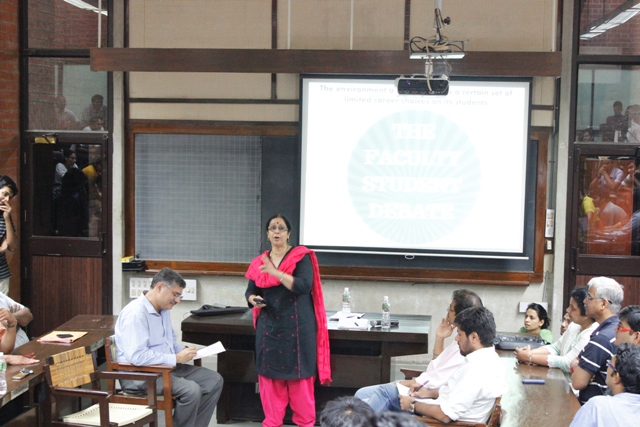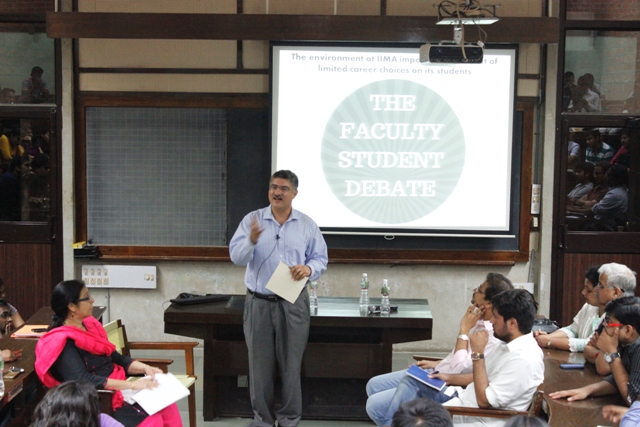IIMA's Student Faculty Debate
In a growing India, and a world of possibility, one might be tempted to assume that the availability of choice is a given, especially to students from B-Schools. The Faculty Student Debate at IIM Ahmedabad, organized by the Literary Symposium Desk, lent voice to the avenues of choice available to a student of the institute. The motion titled "The Environment at IIMA imposes a certain set of limited career choices on students" found the students strongly supporting the topic while the faculty opposed the notion that students were limited in any form. Two students from the IIMA community, Yash Sheel Srivastava and Karan Chadha debated for the motion while the Director, Prof. Ashish Nanda and the Warden, Prof. Asha Kaul debated against the motion.

The students opened the debate by pointing out that a majority of students chose certain streams to begin their careers. They began by positing that these choices were not made independently and were a factor of the competitive environment at IIM A. The academic rigor at IIM A, coupled with the drive to get a job due to socio-economic factors were pointed out as the major reasons for students limiting their choices. Backed with examples of students choosing to go with the flow of the crowd, rather than forge their own paths, the proposition maintained that one of the roles of a B-school was to create managers who could take risks, make unintuitive choices and leave their mark on an organization, and not those who followed a common trend.

The Director, himself a former graduate from the institute began by recounting his batchmates, who had each made their mark in various fields - academia, the non-profit sector, government, entrepreneurship, finance, consulting - thereby proving that IIM A students did not always choose conventional careers. He assured the students that they too would find themselves following their dreams.

Referencing the diversity of students present at the campus, the relevance of the case study method which allows students to tackle real life problems in the field, the opportunities offered by the institute for aspiring entrepreneurs, the professors explained that choice was always offered for those who sought it. The perceived lack of choice was more a factor of the socio-economic pressures prevalent in society today, and the environment and learning at IIM-A in fact offer a plurality of career options, given the structure of the course, the multiple electives and the scope for outside-classroom learning.
The audience - consisting students and members of faculty alike - were of mixed views. While most agreed that it was not the lack of choice at an institutional level, or the absence of facilities that prohibited them for choosing to do something different, there was a large section that maintained that a student who enters the institution is expected to run with the crowd, lest he or she be left behind. Examples and past experiences were shared as the crowd debated with the participants and each other on how constrained or free they felt in defining their future.
Lasting for about an hour, the event was attended by faculty, staff, students from all years and programmes. The Literary Symposium Desk at IIM-A intends to continue conducting such events in the coming year, providing a platform for the students and professors to exchange views and perspectives on relevant common issues.
~: END :~
In a growing India, and a world of possibility, one might be tempted to assume that the availability of choice is a given, especially to students from B-Schools. The Faculty Student Debate at IIM Ahmedabad, organized by the Literary Symposium Desk, lent voice to the avenues of choice available to a student of the institute. The motion titled "The Environment at IIMA imposes a certain set of limited career choices on students" found the students strongly supporting the topic while the faculty opposed the notion that students were limited in any form. Two students from the IIMA community, Yash Sheel Srivastava and Karan Chadha debated for the motion while the Director, Prof. Ashish Nanda and the Warden, Prof. Asha Kaul debated against the motion.

The students opened the debate by pointing out that a majority of students chose certain streams to begin their careers. They began by positing that these choices were not made independently and were a factor of the competitive environment at IIM A. The academic rigor at IIM A, coupled with the drive to get a job due to socio-economic factors were pointed out as the major reasons for students limiting their choices. Backed with examples of students choosing to go with the flow of the crowd, rather than forge their own paths, the proposition maintained that one of the roles of a B-school was to create managers who could take risks, make unintuitive choices and leave their mark on an organization, and not those who followed a common trend.

The Director, himself a former graduate from the institute began by recounting his batchmates, who had each made their mark in various fields - academia, the non-profit sector, government, entrepreneurship, finance, consulting - thereby proving that IIM A students did not always choose conventional careers. He assured the students that they too would find themselves following their dreams.

Referencing the diversity of students present at the campus, the relevance of the case study method which allows students to tackle real life problems in the field, the opportunities offered by the institute for aspiring entrepreneurs, the professors explained that choice was always offered for those who sought it. The perceived lack of choice was more a factor of the socio-economic pressures prevalent in society today, and the environment and learning at IIM-A in fact offer a plurality of career options, given the structure of the course, the multiple electives and the scope for outside-classroom learning.
The audience - consisting students and members of faculty alike - were of mixed views. While most agreed that it was not the lack of choice at an institutional level, or the absence of facilities that prohibited them for choosing to do something different, there was a large section that maintained that a student who enters the institution is expected to run with the crowd, lest he or she be left behind. Examples and past experiences were shared as the crowd debated with the participants and each other on how constrained or free they felt in defining their future.
Lasting for about an hour, the event was attended by faculty, staff, students from all years and programmes. The Literary Symposium Desk at IIM-A intends to continue conducting such events in the coming year, providing a platform for the students and professors to exchange views and perspectives on relevant common issues.
~: END :~
